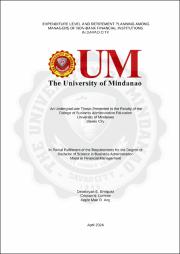Expenditure level and retirement planning among managers of non-bank financial institutions in Davao City

View/
Date
2024-04Author
Enriquez, Decebryan
Lumbre, Cristian
Ang, Apple Mae
Citation Tool
Metadata
Show full item recordAbstract
Expenditure level is a significant aspect that employees, not just business managers, need to become aware of, as it affects their retirement planning and prevents them from achieving financial stability. It gives managers and employees insight into the importance of adequately allocating their income, making them realize the importance of saving for retirement as early as possible and minimizing their consumption. This study aims to determine whether there is a significant relationship between expenditure level and retirement planning among managers of non-bank financial institutions in Davao City. In this study, the respondents were 30 business managers of non-bank financial institutions ages 25–45, selected through purposive sampling. This study utilized a descriptive-correlational research design and an adapted and modified questionnaire. Person product-moment coefficient correlation, mean, and standard deviation were used to analyze the data statistically. The study revealed that savings have the highest mean, meaning respondents actively save for their future and improve their financial independence during retirement. Moreover, consumption has a descriptive equivalent of "high," indicating that only some managers are aware of their consumption habits. The major findings show a significant relationship between expenditure level and retirement planning. This means that managers who track their consumption and save more tend to be more active in retirement planning and have a higher level of confidence in their financial future.
Collections
Publisher
College of Business Administration
